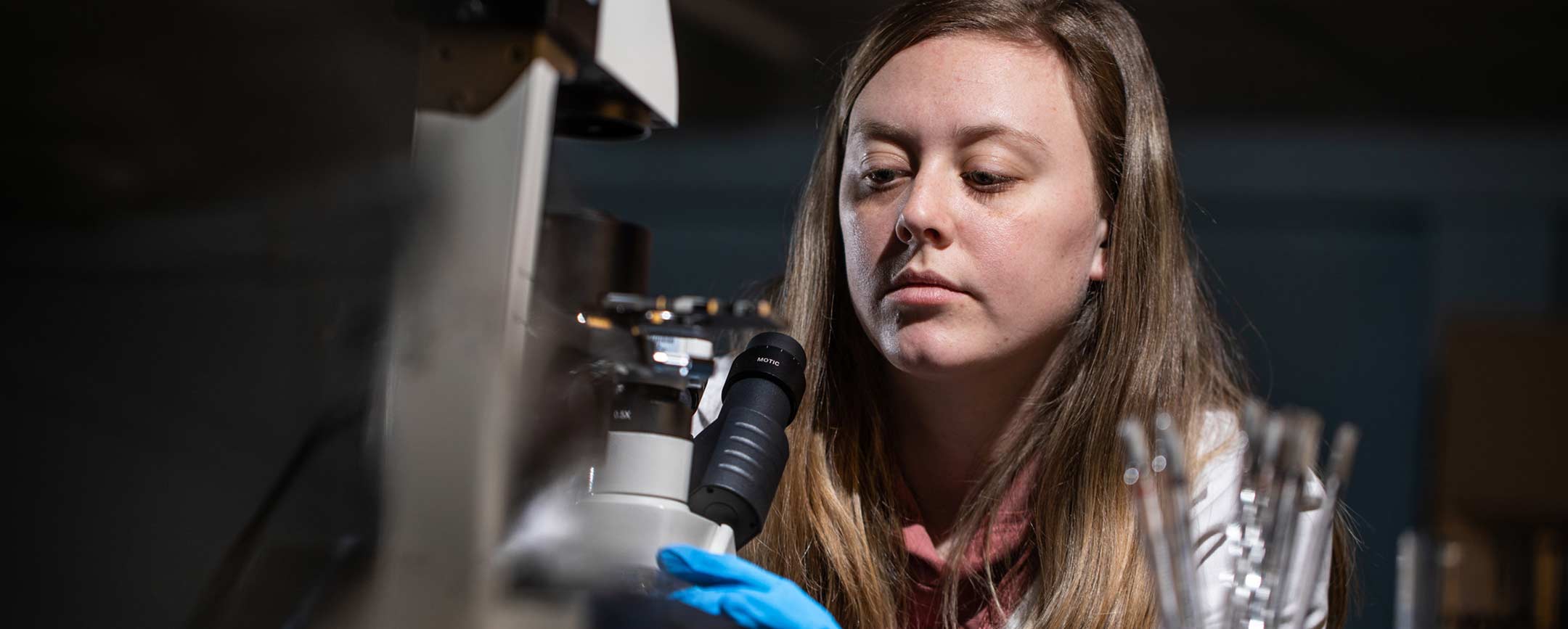
Bachelor of Science in Biology Degree Program
Earn Your BS in Biology at PennWest University and Prepare for Diverse Biology Careers or Graduate Study.
Explore the fascinating science of life with a Bachelor of Science in Biology at PennWest University. This comprehensive biology major is designed for flexibility, allowing you to tailor your biology degree to your unique interests and career aspirations. Our robust BS in biology curriculum provides a strong foundation in core areas like anatomy, microbiology, genetics, and cell biology, complemented by essential coursework in chemistry, physics, and mathematics. Whether you aim for a general bachelor's degree in biology or wish to specialize through concentrations like Molecular Biology/Biotechnology, Mortuary Science, Pre-Medical Science, or Pre-Veterinary Science, our program equips you for success. You'll gain invaluable hands-on experience in modern labs, mentored by expert faculty dedicated to your growth. Learn through practical application, field studies, and independent research opportunities, preparing you for a wide range of biology degree careers, advanced biology degrees, or entry into health professional programs. Discover what you can do with a biology degree from PennWest.
This program is for you if...
- You are passionate about studying living organisms and want a deep understanding of life processes, making a biology major an ideal fit.
- You're exploring biology degree jobs and aiming for a career in healthcare, research, environmental science, education, biotechnology, or other science-related fields.
- You thrive in hands-on learning environments and are eager to engage in laboratory work, fieldwork, and research projects common in bachelor's in biology programs.
- You are considering advanced studies, such as medical, dental, or veterinary school, or pursuing graduate biology degrees (Master's or Ph.D.) after completing your bachelor of science in biology.
-
120 Credits for BS
Curriculum: Your Bachelor of Science in Biology Coursework
What is a BS in Biology at PennWest? It's a high-quality education providing broad training across the biological sciences, physical sciences, and mathematics. As a biology major, you will delve into fundamental topics including ecology, evolution, organismal biology, cellular and molecular biology, and genetics. The curriculum for this bachelor's degree in biology integrates essential chemistry, physics, and statistics coursework. Beyond the core, you can customize your studies with electives ranging from animal histology and immunology to biochemistry and conservation biology.
Choose the general Bachelor of Science degree in biology track or specialize in one of our focused concentrations:
- Molecular Biology and Biotechnology: Explore the molecular basis of life, gene function, and cutting-edge biotech applications.
- Mortuary Science (Cooperative): Prepare for a career in funeral service through foundational biology and specialized coursework (requires transfer to partner institution like PIMS).
- Pre-Medical Science: Build the strong scientific foundation and gain experiences needed for medical, dental, or other health professional schools.
- Pre-Veterinary Science: Focus your biology bachelor degree studies to meet the prerequisites and gain experience for veterinary school admission.
Throughout your studies, you'll gain hands-on training with current methods and technology, develop critical thinking skills, and have opportunities for independent research and internships.

| Degrees, Certificates, Minors | Offered at... | |||
|---|---|---|---|---|
| California | Clarion | Edinboro | Global Online | |
| Biology, BS | Program Offered At This LocationIn-Person | Program Offered At This LocationIn-Person | Program Offered At This LocationIn-Person | Program Not Offered At This Location |
| Biology, Minor | Program Offered At This LocationIn-Person | Program Offered At This LocationIn-Person | Program Offered At This LocationIn-Person | Program Not Offered At This Location |
| Concentrations | Campuses | |||
|---|---|---|---|---|
| California | Clarion | Edinboro | Global Online | |
| Molecular Biology and Biotechnology | Program Offered At This LocationIn-Person | Program Offered At This LocationIn-Person | Program Offered At This LocationIn-Person | Program Not Offered At This Location |
| Mortuary Science | Program Offered At This LocationIn-Person | Program Offered At This LocationIn-Person | Program Offered At This LocationIn-Person | Program Not Offered At This Location |
| Pre-Medical Science | Program Offered At This LocationIn-Person | Program Offered At This LocationIn-Person | Program Offered At This LocationIn-Person | Program Not Offered At This Location |
| Pre-Veterinary Science | Program Offered At This LocationIn-Person | Program Offered At This LocationIn-Person | Program Offered At This LocationIn-Person | Program Not Offered At This Location |
Meet Our Faculty
Our faculty are not just instructors; they are mentors, researchers, and industry professionals committed to providing an education grounded in real-world experiences and academic excellence. From engaging classroom discussions to hands-on experiential learning, our educators are here to support and inspire you every step of the way.
Learning Environment: Earning Your Biology Degree In-Person
This bachelor of science in biology program is offered in-person across our PennWest campuses. The in-person format emphasizes direct interaction with faculty, collaborative learning with peers, and hands-on access to our state-of-the-art laboratory and field equipment, crucial for developing practical skills in biology.
Exploring the Wonders of Biology at PennWest
What does it mean to study biology at PennWest? What characteristics do biology students need to be successful? Hear from Dr. Kiran Misra, from PennWest's Biology Department, and PennWest students Rayda and Virginia about their experiences.
Career Paths with Your Biology Degree
Wondering what can you do with a biology degree? A BS in Biology from PennWest opens doors to a vast array of biology degree jobs and further educational opportunities. Our graduates succeed in diverse biology careers within the private sector, academia, and government agencies. Many jobs with a biology degree serve as stepping stones to advanced positions requiring graduate biology degrees or specialized professional training. This program provides the strong foundation needed whether you aim to enter the workforce directly or pursue advanced studies.
Career Paths
- Biologist
- Botanist
- Zoologist
- Pharmacy Technician
- Phlebotomist
- Respiratory Therapist
- Veterinarian
- Veterinary Technician
- Funeral Directors
- Embalmers and Restorative Artists
- Medical Examiners
- Pathologists
From Biology Major to Physician Assistant Graduate Student
Facing significant challenges growing up, Jenna Joseph saw education as her path forward. Inspired by her brother, she pursued a demanding biology major at PennWest, specializing in the Molecular Biology/Biotechnology concentration. Despite obstacles, including balancing remote learning during the pandemic with work to support her family, Jenna persevered. Her hard work and the strong foundation from her bachelor of science in biology paid off; she successfully graduated and gained admission to a competitive Physician Assistant graduate program at Case Western Reserve University, demonstrating the transformative power of a PennWest biology degree.

How We'll Help You Succeed
At PennWest University, we prioritize your success and well-being from the moment you join our community. Our comprehensive student support system is designed to meet you where you are, offering personalized guidance, academic assistance, and emotional support to ensure you can fully focus on your studies and personal growth. Whether you're a first-generation college student, returning for further education, or navigating career changes, our dedicated faculty and staff provide the encouragement and resources you need to overcome challenges and thrive. With a wide range of services from tutoring and career counseling to mental health resources, PennWest stands by your side, empowering you to achieve your academic goals and prepare for a successful future. Join us at PennWest, where you're not just a student; you're part of a supportive family committed to helping you find your place in the world.
40%
of all biological scientists are employed by federal, state and local government organizations.
-
Affordable Programs
Tuition & FeesDiscover quality education that fits your budget with our affordable programs at PennWest.
-
Success Coaching
Success at PennWestAchieve your academic goals with personalized guidance from our dedicated student success coaches.
-
Post-Graduation Support
Life After PennWestWe're here for you even after graduation, providing support and resources to help you succeed in your career.

